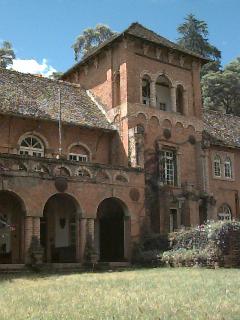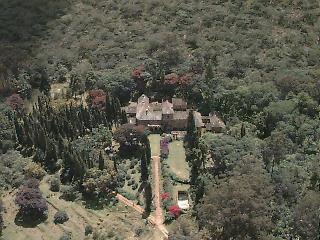Flights of Tom Claytor:
The
Journals of a Bush Pilot
Travelling Though
Africa
![]()
Tom Claytor is currently flying a C180 solo around the
world.
![]()
"He who enters the thick bush does not turn back when he hears sticks
breaking," Kapumpe tells me. Kapumpe is a Bemba; he comes from the north.
His father had told him many wise proverbs like this when he was young. I fly
down the Lunsemfwa river then up the Lukusashi river. For three hours, I am
suspended over a twirly expanse of green. There are no roads down there; it is a
complete wilderness - trees, bush, and sandy verges along the river. Only
occasionally do I see colored green circles of cultivated fields, but still no
roads - just tiny villages alone in the wilderness. Far to my left is lake
Bangweulu - also Bemba - "the place where the sky meets the earth."
In a vehicle, it is 8 hours and 800 kilometers from Lusaka to here. I make a
note that travel by small plane is almost three times faster than by Zambian
road. This really appears to be in the middle of nowhere. I am looking for a
mansion amidst the forest on the side of a mountain. Hopefully, there should be
an airstrip too.
The "er...um's" name is Carol - a pretty Canadian girl, and David
is called "Dai" - his Welsh nickname. "David Livingstone's last
journey passed through here in 1867 before he died at Chitambo," Dai tells
me. "He climbed that mountain over there, and his dog drown while crossing
the lake - probably eaten by a crocodile." David's grandfather found this
place while following Livingstone's footsteps in 1914. He had finished putting
in the boundary between what is now Zambia and Zaire.
We walk down a dark passage with high walls and charred rafters overhead,
from a past fire, and sit by candlelight in the kitchen. "This is an
unusual house for Africa," Dai tells me. "It was built by a Scottish
missionary who came out to translate the bible into Bemba; he went mad."
Dai smiles. I inquire about the monstrous mansion near the airstrip. "That
is Shiwa house; the house that my grandfather built. We used to live there, but
the roof is about to fall in, so we came here."
The Shiwa estate is nearly 23,000 Acres and spreads all around the lake and
the mansion. At present, there are 3 dogs, 4 cats, 3 kittens, 400 cows, 150
sheep, 100 pigs, 4,000 chickens, and 10,000 Bemba dependents. This is not an
easy land to farm. The soil is very acidic and sandy. It does not have a great
carrying capacity for cattle because of the thick bush and restricted grass. Dai
has been suffering for several days with acute malaria, so his fuse is a bit
short. I hear him yelling at an African while his three yellow Labradors bark
and attack the elder man from all sides. "I told him not to walk across the
property," Dai says. I can see the strain that it must be to manage the
operation of this farm, especially with malaria. Dai tells me a story about one
man who was sitting down on the job. Dai screams at him, "what the hell are
you doing?" The timid man calls back, "no, I am just busy waiting,
bwana." A wife of one of the workers has just died of malaria in the
village; many people are preparing for the funeral. Dai tells me, "It's not
a very good parasite, malaria. A good parasite shouldn't kill you, but I suppose
it is a 'munt' parasite; it is African, and it just doesn't make sense."
Dai has taken one course of fansidar, with no effect, so he is now taking a
course of halfan. Carol tells me that some women in the village take overdoses
of chloroquine to abort unwanted children; a lot of the malaria is now resistant
to chloroquine.
Dai tells me a story about the sawmill on the farm. It came in via Lake
Tanganyika, and the customs at the time wanted to charge duty. There was some
discussion, and because the words "saw teeth" were printed somewhere,
they were able to waive the duty and bring it in as "dental
equipment." That was back in the 1950's, and the saw was already 40 years
old then. It is just waiting for a new blade at the moment, but it is still
working. All around the old mill are the remnants of machinery that used to
produce essential oils. Dai's brother, Mark, tells me that all this used to be
working when he was little; essential oils were the only thing that ever made
any money. A disease then wiped out all the lime trees.
At the clock tower, the postmaster Godfrey Makupula shows me a long footpath
beneath towering eucalyptus. Up the hill and far in the distance, after several
series of steps and two more gates, stands Shiwa House. It took 5 years, 3
English craftsmen, and 1,000 Africans to construct this mansion. It was
completed in 1932. The grandfather who built this was Lieutenant Colonel Sir
Stewart Gore-Browne. He was tired of soldiering. Each time someone came to visit
him, he would add a wing. Back then, visiting was not such an easy affair. The
journey by ship to Dar es Salaam would take about 3 weeks, then by rail to lake
Tanganyika, then by boat down the lake, then finally by foot for over 250 miles.
It was not possible to use horses or oxen for the journey because of sleeping
sickness from the tse-tse fly, so the journey on foot alone was another two
months. It was probably about a 4 or 5 month journey.
"If a wall wasn't straight, he would knock it down," Dai tells me;
"my grandfather had a hell of a temper, that is why the Africans called him
'chipembele' - the rhinoceros." In his malarial state, Dai doesn't seem too
far from having inherited a touch of chipembele himself. On either side of the
doors beneath the balcony hang two wooden carvings of rhino heads. There are 40
rooms in the mansion; each one has a fireplace, including the bathrooms.
"He was a visionary, but he was vain," Dai continues. "He wanted
to be the Lord of the Manor on the hill with all the serfs around." Up in
the library, there are shelves of wonderful old books along every wall. Above
the fireplace are the words, "Ille terrarum mihi super omnes anculus ridet"
- this corner of the earth makes me smile above all others. "His joy was
his library; he was erudite, an Edwardian man," says Dai. In the downstairs
sitting room hangs a huge portrait of Ethel Locke-King. She was Sir Stewart's
aunt. She was the first woman ever to fly in an airplane at Brooklands, her
estate in England, I am told. This was also the site of the first horse racing
track in England. She was the one who provided much of the money to build this
mansion.
The outside is beautiful. It is a combination of an English manor house and a
Florentine villa. The roof is constructed of clay tiles, made on the farm. They
look very soft from a distance, but the heavy weight has caused them to sag and
bend along the various contours of their support in a very attractive way.
Unfortunately, on the inside, slow leaks have started to bring down the plaster
from the ceilings in some portions of the house. As I wander back into this
maze, I loose all sense of where in the house I might be. I find room after room
full of bats careening up and down the murky corridors. It couldn't imagine a
more perfect setting for a ghost.
"But there is a ghost," I am told. Bill Parish is an American
forester from Tennessee. He weighs about 350 pounds, drinks a case of Coke a
day, and took up two seats on the plane coming out. He was here to give advice
on forestry, but he was told that there wasn't a ghost in the house. His reply
was, "I'm sorry, but I can't be in this house without it having a
ghost." So he began to tell the story of Miss Monroe. The only true part of
the story is that there actually was a Miss Monroe. She was the aunt who came
out to tutor Dai's sister many years ago; she stayed in one of the wings of the
house. Bill has gone back to America, but the story lingers on. Every six
months, Bill sends a new chapter out to Dai so he can pass it on.
In May of 1992, David found his parents murdered on their Chisamba farm. They
had been shot by AK-47 in the chest and the neck while sitting in the living
room. He was 23 or 24 at the time. They were ANC from South Africa, I am told.
Two of them have been sentenced to be hanged, but as of yet, the sentence has
not been carried out. "If they had been Zambians, I would have left,"
Dai says. "But I became a much harder person after that. I used to be a bit
wishy-washy; now, I get on and do it.
Dai's dream is to preserve Shiwa House if he can. "To keep alive that it
was possible to do this in the middle of the bush at that time," he says,
"as an inspiration to others. It would be nice to develop it as an
educational institution of some sort. Perhaps with wildlife for locals to learn
and understand, the parks are too expensive and are out of reach for them."
He has six months until the rains come. In that time, he will have to find some
way of securing the roof against leakage until it can be properly repaired and
restored. It seems to be a very precarious and critical time to me. There is a
question among the children of who will own the house, and having more than one
person responsible for something seldom works. If nothing is done, the house
will become a ruin - a relic of the past and only a memory of a time long since
gone.
The doors unlatch and creek open on their own from time to time, but it is an
old house, and this happens in old houses as the frames shift. On several
occasions the servants used to appear without being called, "but you rang
the bell," they would say. The cook even used to answer without being
spoken to, but would then explain that he had been asked a question. Three weeks
after Sir Stewart's death, Major Harvey was sitting in the library. He was
talking to the chair where Sir Stewart used to sit. The black cat named
"Smith," that would only let Sir Stewart touch it, was sitting on the
arm purring, as it only would do with Sir Stewart. There was a depression in the
chair. Major Harvey's wife walked in and said, "who are you speaking
to?" The Major replied, "I am speaking to your father." "But
there is no one there," she said. "Yes there is; he is sitting right
there." They are all gone now, but perhaps, the house will live on. 15 Apr 1996 - Shiwa N'gandu, Zambia
15 Apr 1996 - Shiwa N'gandu, Zambia
 I turn to the right and weave my way through the rain. The light is pink and
fading in the western sky. I am trying to concentrate on the rain and the
mountains, but I can't. I have never seen such a sky. The storm to the west is a
deep purpley blue - a color that it shouldn't be - surrounded by a harsh and
vivid pink. I keep trying to remember the colors, but how does one remember a
color. I manage to not hit a mountain, and I slip out across an open plain. In
the distance, a wriggley river leads to a lake. This is Shiwa N'gandu -
"the lake of the royal crocodiles."
I turn to the right and weave my way through the rain. The light is pink and
fading in the western sky. I am trying to concentrate on the rain and the
mountains, but I can't. I have never seen such a sky. The storm to the west is a
deep purpley blue - a color that it shouldn't be - surrounded by a harsh and
vivid pink. I keep trying to remember the colors, but how does one remember a
color. I manage to not hit a mountain, and I slip out across an open plain. In
the distance, a wriggley river leads to a lake. This is Shiwa N'gandu -
"the lake of the royal crocodiles."
 "He who
admires a village, only admires the roof" - another one of Kapumpe's Bemba
proverbs. I think it means that if you see the outside, you still don't know
what is on the inside. I find a roof. It is extraordinary, surrounded by trees,
spreading off in all directions to various wings and courtyards. I can't tell
what it is made of. It seems to be made of tawny velvet, soft and flowing and
far from the corrugated iron roofs of most colonial buildings of southern
Africa. I land on a nearby slope and am soon surrounded by joyful Bembas. One of
them hands me a civil aviation official landing record book to record that I
have indeed landed. There are not many entries. A vehicle arrives in the last
light, and I am invited by the farmer David Harvey to stay with him and his
"er...um."
"He who
admires a village, only admires the roof" - another one of Kapumpe's Bemba
proverbs. I think it means that if you see the outside, you still don't know
what is on the inside. I find a roof. It is extraordinary, surrounded by trees,
spreading off in all directions to various wings and courtyards. I can't tell
what it is made of. It seems to be made of tawny velvet, soft and flowing and
far from the corrugated iron roofs of most colonial buildings of southern
Africa. I land on a nearby slope and am soon surrounded by joyful Bembas. One of
them hands me a civil aviation official landing record book to record that I
have indeed landed. There are not many entries. A vehicle arrives in the last
light, and I am invited by the farmer David Harvey to stay with him and his
"er...um."

Tom Claytor
Continue with Part 5 of Tom in Africa. Click Here.
![]()
Note from the Editor. A link to Tom's latest reports can be found in the eBush Communications Page.
Use the attitude indicator as your guide back to Inside Africa.
Top of this story.

Last modified on
March 05, 2006 .
© Virtual Horizons, 1996.